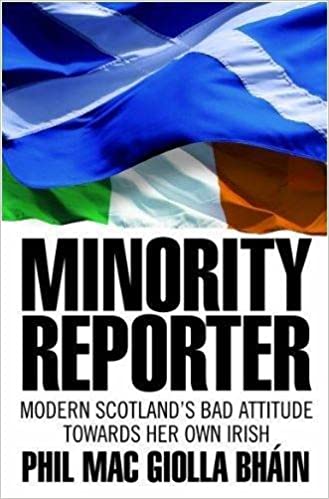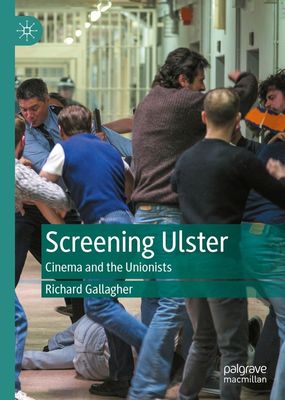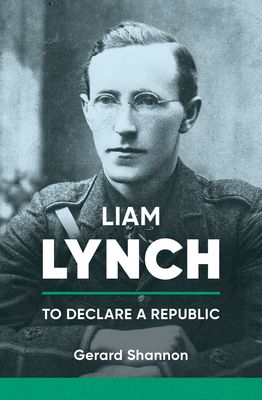Minority Reporter: Modern Scotland’s bad attitude towards her own Irish, by Phil Mac Giolla Bháin (Frontline Noir, £9.99)
IMAGINE the public row that would break out should football fans sing a song on the terraces demanding that a black player born in Britain should go home. Then imagine that the barracked footballer is a British-born Jew. Now imagine the song being directed at the crowd who support the black or Jewish player’s team.
Such unacceptable behaviour would be dubbed racist and provoke an outcry. Given that the men were Britons, it would also be an example of gross ignorance. But, in Scotland, particularly in Glasgow, racist conduct towards people of Irish background, many of whose ancestors emigrated generations ago, persists.
Although it doesn’t just happen inside football grounds, its most manifest instance is a disgraceful song that, despite being deemed racist by Scotland’s highest court, continues to be heard.
According to its opening verse, immigrants from Ireland during the famine years of the 1840s (and over the course of the following century) “brought us nothing but trouble and shame”. Then comes the offensive refrain: “Well the famine is over. Why don’t they go home?”
That song is the central feature of a penetrating analysis of anti-Irish racism by Phil Mac Giolla Bháin, who was born and raised in Scotland. His book was published in 2013 and I’m reviewing it a decade later for three reasons. First, because so little has changed; second, because it received no reviews at the time, itself significant; and third, because it makes a coherent and compelling distinction between sectarianism and racism.
I could add a fourth. There is a definite link between the anti-Irish attitudes to be found in Glasgow with those evident in Belfast, where loyalists have adopted the famine song as their own.
But let’s concentrate on Scotland’s shame, the tacit acceptance of racism that is unacceptable elsewhere in Britain. In 2017, a survey by a charity called Show Racism the Red Card found that 56% per cent of 513 people living in Scotland, and identifying as of Irish descent, said they had experienced anti-Irish racism.
In 2021, a large group of Rangers fans were filmed marching through Glasgow’s city centre singing the famine song. It prompted the then justice minister (and now Scotland’s First Minister) Hamza Yousaf to declare that the images "disgusted" him, referring to it as an example of anti-Irish racism.
Chief Superintendent Mark Sutherland, Police Scotland’s divisional commander for Greater Glasgow, also called it “racist conduct”. However, his pledge that “appropriate action” would follow resulted in very few arrests.
Also significant was the way in which the incident was reported. It was, said the BBC, “sectarian singing”. This, from Britain’s public service broadcaster, was entirely unacceptable. It was not only a mistake, but a falsehood since it perpetuated the myth that there was an equivalence between the racists and those they were abusing.
This is one of Mac Goilla Bháin’s major themes, that racism has not been taken seriously because it has been “hidden from view by the sectarian framework.” It is easy to do nothing if blame can be apportioned to both sides, each said to be as bad as the other. People here in Belfast need few lessons about that evasion, which masks the reality.
Another similarity between Glasgow and Belfast is the religious dimension. In this narrative, running in parallel with the sectarian fallacy, it is suggested that hostility towards the Irish is based on the religious divide between Protestant and Catholic. Yet, as the author points out, many thousands of people from an Italian background do not suffer undue, or any, criticism for their Catholic faith.
Yet another disturbing factor about racial prejudice is the way it leads to what might be termed “casual racism”, the sort that its perpetrators seek to pass off as little more than banter. Can’t the Irish take a joke? Hence a gob-smacking comment by SNP MP Mhairi Black in 2018 about “plastic Irishmen”, a jibe suggesting, without proof, that people living in Scotland who continue to assert their Irish roots are somehow guilty of cultural appropriation.
No uproar about that, by the way. Which takes us to the other disquieting aspect, the lack of media coverage that followed the publication of Mac Giolla Bháin’s fascinating book. Was that a sign of embarrassment? Or was it, as is more likely, a refusal to give publicity to his finely argued polemic?
A decade ago this week, I wrote this in @CelticView about the need for a Famine Memorial in Glasgow.
— Phil Mac Giolla Bháin (@Pmacgiollabhain) July 24, 2021
Tomorrow it will be unveiled at St Mary's in the Calton- the birthplace of Celtic.
Míle Buíochas to all those who made it happen.
👏👏https://t.co/GVGzU7Zwqv
Once the red herrings of sectarianism and religion are exposed as false, and the evidence is studied dispassionately, the reality of anti-Irish racism could not be more obvious. Mac Giolla Bháin, who left Scotland in 1996 to live in Donegal, recounts examples where he has changed people’s minds.
With the famine song in mind, and its explicit disparagement of the genocidal crime in which a million died and a million more were forced to emigrate, he wrote about the absence of a memorial in Glasgow to An Gorta Mór.
It was more than eight years later before one was finally erected outside a Catholic church where Celtic football club was founded in 1888. But Glasgow city council imposed a condition: the memorial must be shared with the victims of the potato blight that occurred in the Scottish Highlands around the same time.
This was a cynical act, according to the journalist Kevin McKenna, who accused the council of being “evasive, duplicitous and uncooperative” during the prior 18 months of negotiations.
It is surely significant that the Sunday Times chose to report the statue’s unveiling in terms of the possibility that it would “heighten tensions” within the community by being seen as a provocation by members of the Orange Order. Why should a memorial to a million people who suffered agonising deaths provoke anyone?
That incident alone underlines Mac Giolla Bháin’s central argument about anti-Irish racism. And, in the circumstances, it is little wonder that Jeanette Findlay, chairwoman of the famine memorial committee, responded to the undisguised intolerance by saying: “Some would regard as controversial anything that commemorates the plight of the Irish.” The Irish in Glasgow, that is.
*Phil Mac Giolla Bháin’s latest novel, Native Shore, is available from Frontline Noir.






